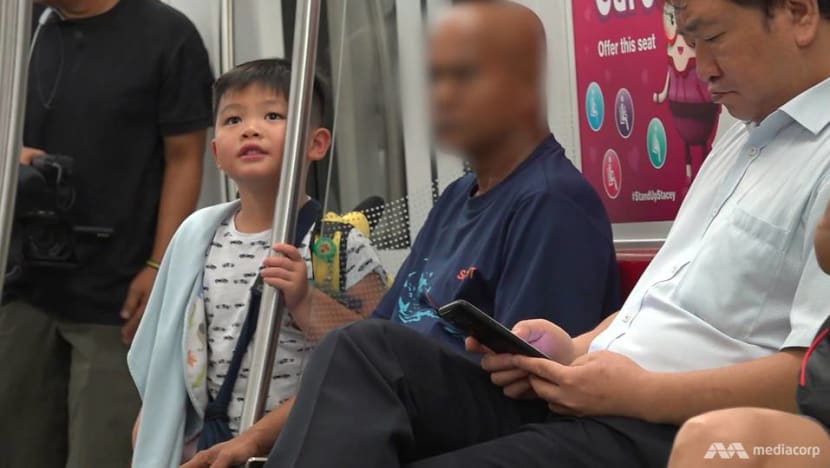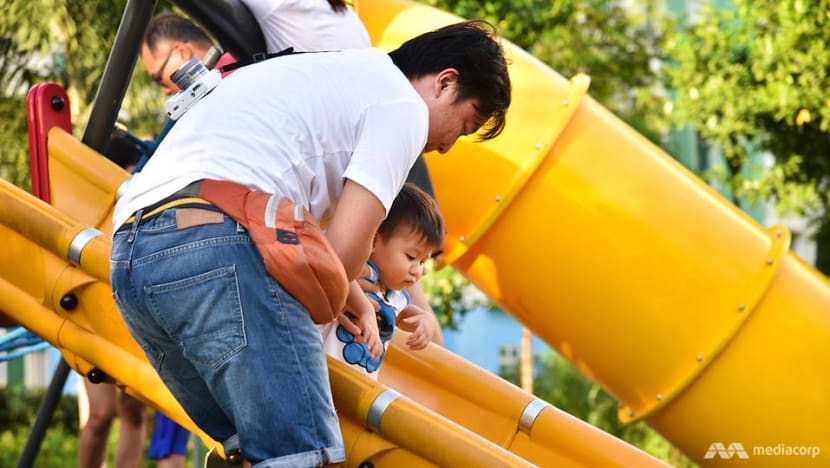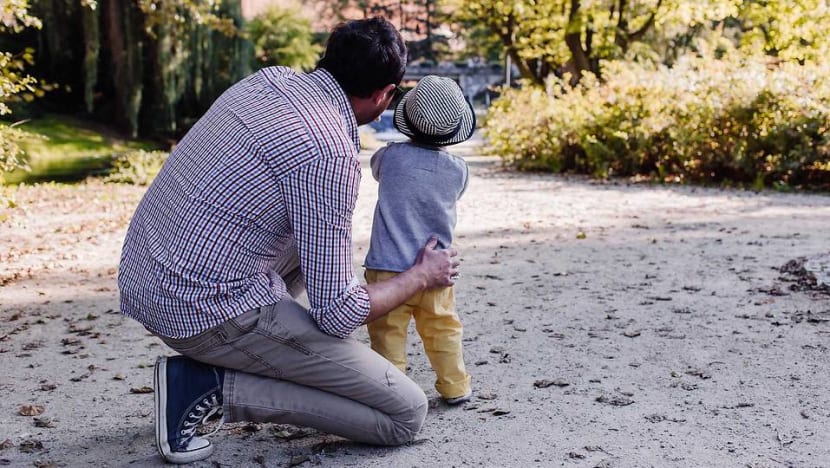commentary Commentary
Commentary: Should you let your 5-year-old run errands outside of home?
Whatever your view about the errand a 5-year-old carried out to deliver a briefcase to his dad 17 MRT stations away, let's remember to give our kids a chance to demonstrate their capabilities in a safe environment, says psychologist and author of Negotiation Parenting, Foo Koong Hean.

Nathanael, aged five years and one month, was sent to take a train by himself for the first time. It was a 35-minute journey with 17 stops.
SINGAPORE: Should a 5-year-old child be out by himself in the streets of Singapore running errands for his parents?
On the back of news discussing how a 5-year-old delivered a briefcase to his father 17 MRT stations away, I can understand concerns from readers about safety, and whether a 5-year-old can manage crossing the road by himself, avoiding distractions to stay the course and navigating an unfamiliar territory, armed only with a hand-drawn map.
Part of the shock might arise from readers whose similarly aged kids have never done even the simplest of such chores at home before and therefore might be loath to have them embark on such a long, complex, cross-island journey in the first instance.
If I had to do it my way, I'll start small, and have my kid run an errand within walking distance first before allowing him to venture onto the public transport system, and will ensure that I maintain contact, perhaps on a mobile phone. I am sure most parents start easy.
I might also prefer my kids run such errands in pairs, with someone trusted like a sibling or a neighbour’s child.
What is key for me is helping them build that sense of independence and desire to contribute to the family.
MINDSETS AND BELIEFS
Singaporean parents have their own sense of what parental love looks like. Some find it important to help their young children through life and tend to them with as much parental care as possible.
Some do all of their household chores by themselves without involving their children and see it as their top priority to ensure their kids are clothed, bathed, fed and tended to. Conversely, to them, leaving a child to do things for himself is seen as a form of neglect.
A new form of helicopter parenting has emerged where many parents see their children as unable to manage life for themselves given their helplessness, and assume that if left to do something on their own, they’ll mess up. So, rather than having to clean up the mess, parents pre-empt and intervene.
There are also parents who believe children should be supervised at all times.
READ: Are you a helicopter parent? A commentary

This is especially prevalent in small families where children are often treated as precious gifts of nature that need to be nurtured, loved, and cared for throughout life. This stands in stark contrast compared to large families, where children grow up on their own with lots of space to be their own person, becoming more independent and capable.
READ: Smaller families in Singapore, leading to unhealthy parenting styles, a commentary
Parents need a growth mindset to find a parenting style that suits each child – some will need more guidance than the rest, some will develop better with more space, but judging by the comments to the news report, many parents are not open-minded enough to consider parenting of a different style.
WE NEED TO TRUST OUR CHILDREN
Children are smart enough to pick up clues, tricks and skills; they grow everyday if they are given the chance to be themselves, to watch, learn, do, get feedback, do better the next time, with some help or on their own.
It is understandable why some parents see young children running errands as unsafe, and potentially dangerous. The world is so complex and uncertain with dangers that might put our children at risk when they are outside, without parental presence or supervision for extended periods of time.
Strangers cannot be trusted. Roads are too dangerous. Too much stimuli in the environment can confuse the child. The list goes on.
LET THEM BE INDEPENDENT
In that context, asking a 5-year-old to move across Singapore by himself might be a stretch.
But I hope it doesn't discourage Singaporean parents from embracing a more open mindset in general and allow their children to find themselves in new situations and learn from them. They might be pleasantly surprised. After all, which parent is not amused by the sight of his or her child feeding or dressing himself?
This is not the result of growing up, but comes through a process of allowing the child to try, make mistakes, try again, learn, and better himself – a trial-and-error type of learning.
Our kids' learning can come in many ways: Through coaching, by watching, through personal practice, by retrying, through reading, consulting with friends or peers or open sources like the internet, by accident and through failure.

READ: Protecting your kids from failure isn't helpful parenting, a commentary
Parents should not be fixated with the mess, mistakes or embarrassment a child makes, but should encourage them to help themselves. Helping a child can hinder their acquisition of skills, which may affect their social and psychological development, as psychologists and child development experts have pointed out in numerous studies.
A 2018 study by development psychologist Nicole Perry of University of Minnesota, Twin Cities and her colleagues in the US and Switzerland found that when parents exert too much control and step in before children can manage challenges on their own, they may inadvertently stunt their children’s emotional development and hinder the development of their ability to regulate their own behaviour.
Parental control can have a positive influence on young children’s academic achievement, a study by University of Hong Kong’s Daniel Fu and his colleagues found, but the same study also highlights that excessive parental control may induce social anxiety and impede kids from developing the skills to study effectively on their own.
RESHAPE OUR MINDSETS
Let children grow up, with minimal helicopter parenting, some coaching and maximum space to discover how they can do things for themselves.
READ: Learning to let go as a parent of a Primary 1 child, a commentary
Parents can definitely learn and glean useful insights on parenting from the parents featured in the Channel NewsAsia documentary. There will definitely be questions and doubts, but these can be addressed gradually as they find their footing and preferred style of parenting.
Indeed, the documentary highlights broader lessons on parenting, communication and child development that might be useful to parents, even if the example of taking a long journey to deliver a briefcase to dad makes us uncomfortable.
Dr Foo Koong Hean is an adjunct senior lecturer at James Cook University, and online private practitioner. His book Negotiation Parenting: Or how not to Raise a Brat in Today’s Complex World was published in 2015. Dr Foo is also co-editor of First Class Behaviours for First World Nations: Public behaviour in Singapore, and Asia-Pacific Perspectives Intercultural Psychology, published in 2019.














